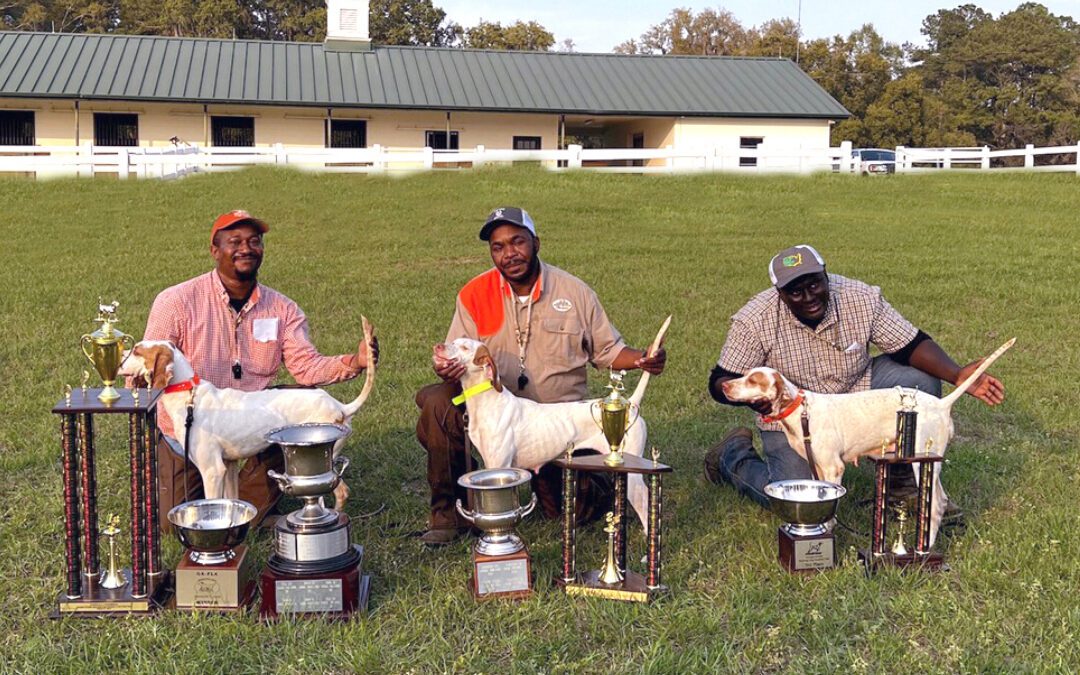For the past 43 years, on the first Monday in March, after the close of bobwhite quail season on the fabled plantations of the Red Hills Region that that spans Tallahassee, Florida, north to Thomasville, Georgia, the invitation-only Georgia-Florida Shooting Dog Handlers Club brings top local African American trainers into a heated field trial competition marked by great dog work, a gallery of hundreds and an abundance of trash talk that peppers friendly rivalries.
After a hard season of hunting, the field trial gives the handlers an opportunity to cut loose and showcase their skills and pointers in spirited competition. The winner gets a trophy but, over and above it, gains bragging rights for the year.
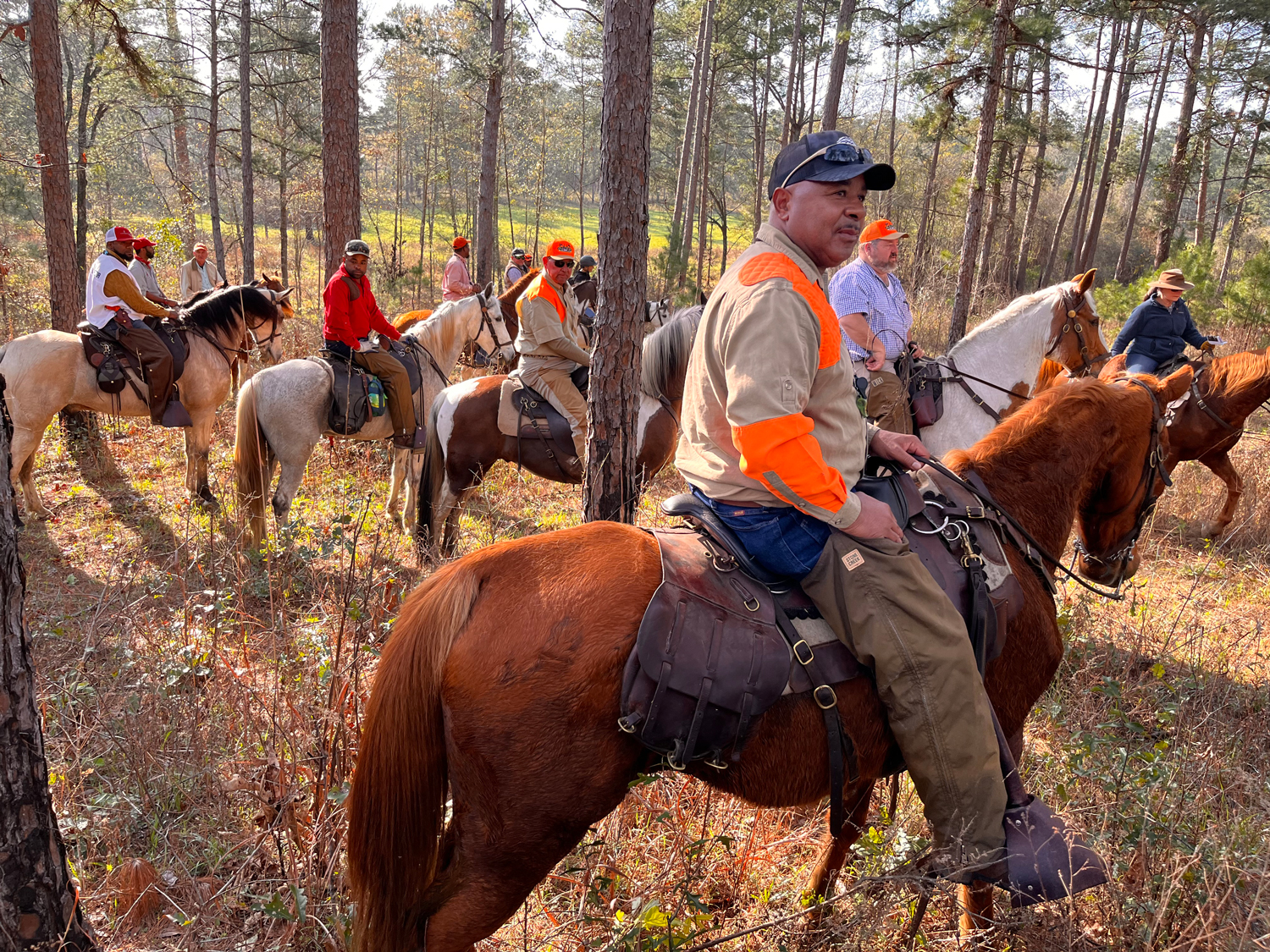
The Georgia-Florida Shooting Dog Handlers Club is commonly known around these parts as the Black Dog Handler’s Field Trial. I first heard about it after moving to Thomasville in 2016. Edmond Doolittle, a mechanic who works on my vintage Porche and a lot of the Land Rovers and Land Cruisers used on the plantations, has a side gig raising the Tennessee walking horses ridden by field trailers and plantation owners. It was only through this inside connection that last year an inveterate Yankee like me was able to secure a highly coveted invitation as a ride-along.
The Black Dog Handler’s Field Trial rotates every year through the area’s private quail plantations. The Red Hills Region is home to approximately 150 plantations spread across nearly 650,000 acres of pristine habitat maintained for hunting explosive coveys of wild bobwhites—all made possible by fat wallets, conservation easements and a dedication to tradition. Many of these properties date back to the Civil War. After the South surrendered, most of the plantations became relics no longer economically viable without slave labor. Gilded Age industrialists from the North and Midwest swooped in to buy and renovate a number of them, turning destitute agricultural operations into sumptuous winter getaways. These nouveau riche arrivistes to the South wanted to outshine the glamorous British estates renowned for resplendent game bird hunts, so they countered with their own quail hunt spectacles replete with mule-drawn wagons, beautiful dogs, al fresco festivities and large parties of hunters and onlookers.
During Reconstruction, many of the liberated slaves were given the opportunity to transition into paying quail-related jobs such as bird-dog handlers, wagon drivers and guides. Today, descendants of those freed slaves continue their dog-work legacy in the Red Hills Region, having learned the dog-handler’s art through their daddies, granddaddies and uncles by working on the plantations after school, summers and weekends.
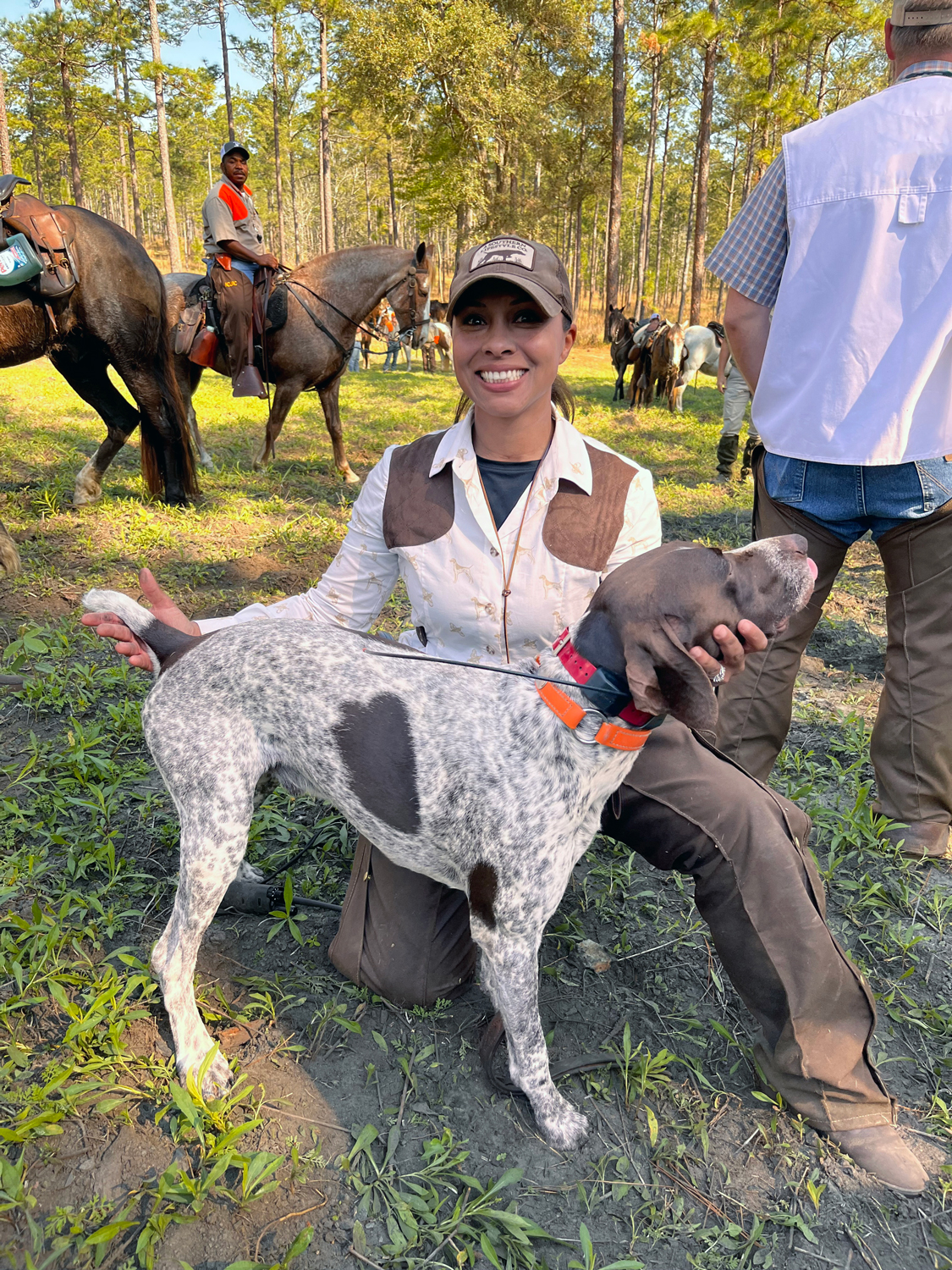
When it comes to sustaining regional traditions such as the Black Dog Handler’s Field Trial, the Red Hills Region’s plantations rely on their Tallahassee neighbor, the Tall Timbers Research Station, to maintain a traditional quail hunting habitat that harkens back to the 1800s. Tall Timbers is an innovator in conservation through the implementation of fire ecology and game bird management. That means the field trials have access to among the best private lands in the country for hunting bobwhite quail.
The 2023 Black Dog Handler’s Field Trial was hosted at Long Pine Plantation in Thomasville through the gracious efforts of Rick Leverich and Sheree Lucero. Among the 22 competitors, we saw plenty of African American dog-handler legends including Neal Carter, Jr., Bernard Parker, Willie Sims, Jr., Jeff Arnold and father-and-son contestants Curtis Brooks, Sr. and Curtis Brooks, Jr. And as it turned out, we would see history made when Manda Michaelis became the first African American woman to be inducted into the club. During the closing ceremony, she was awarded a special trophy in recognition of her accomplishment.
The field trial started with the kind of cool morning that elevates the spirits and performance of the hunters, dogs and birds. The competitors mixed it up across some 4,000 acres set aside for the field trial on the roughly 7,000 acres of Long Pine Plantation. After a quick safety briefing, Neal Carter, Jr., the 2023 marshall, officially opened the competition by saying a prayer on horseback in the staging area.
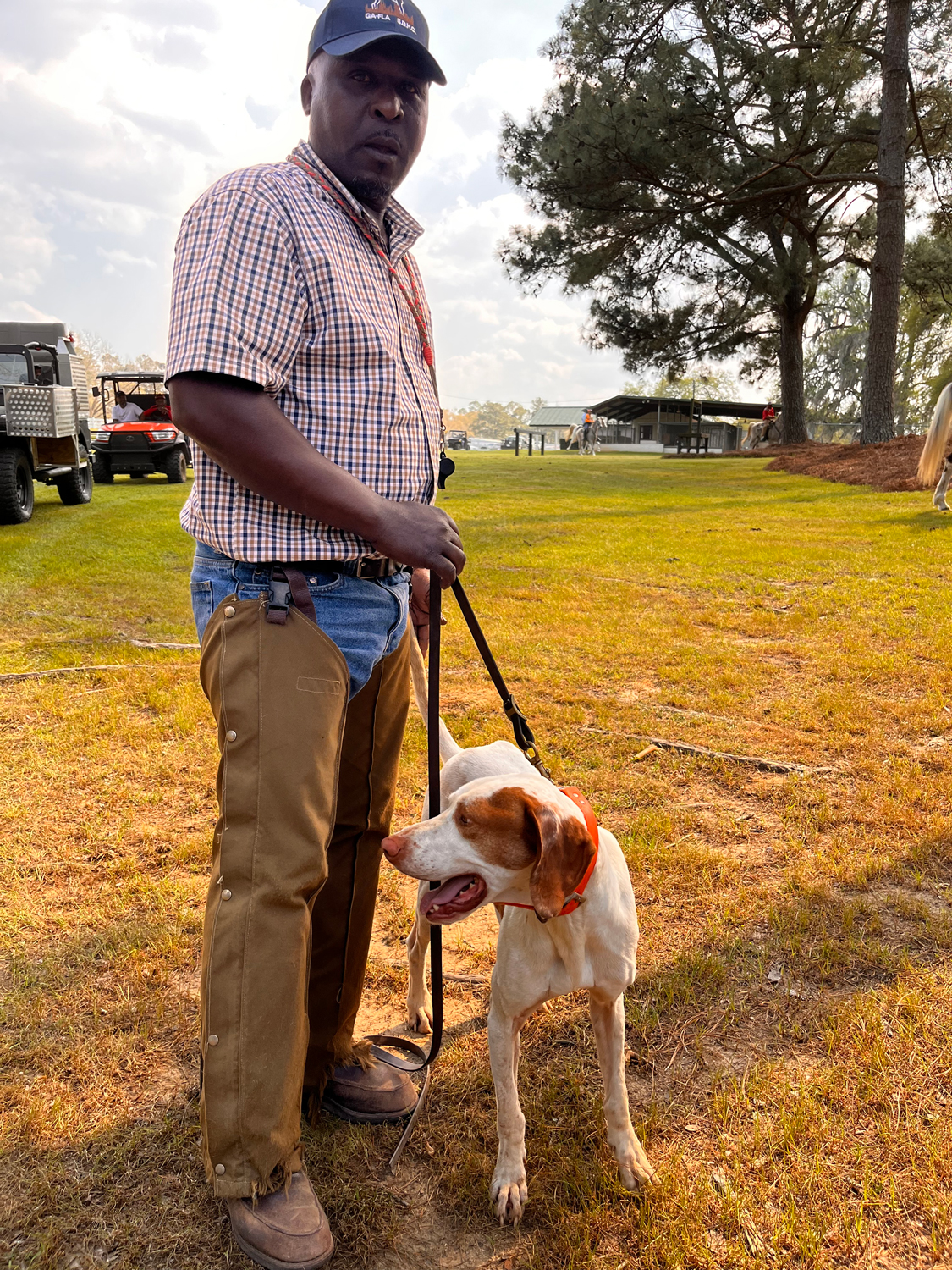
Friendly rivalry is a hallmark of the Black Dog Handler’s Field Trial. Club members like to think of themselves as extended family. Neal is one of the club’s founders and has served as its long-standing president. He recently retired from Sinkola Plantation in Thomasville where his father worked. Neal and other club stalwarts such as Harry Cromartie, Joe Fryson, Clinton Hutto and Willie Battles, Jr. are happy to share tales of how their granddaddies, daddies and uncles who worked on the quail plantations taught them how to train bird dogs. Like other Red Hills African American dog handlers, these gentlemen have known each other pretty much all their lives with plenty of latitude allowed in the incessant banter afield.
The Black Dog Handler’s Field Trial is certainly not for the thin-skinned. Aside from the tough competition, trash talkin’, razzin’, hootin’ and hollarin’ are fully encouraged as though everyone has been invited to an enormous family cookout. It’s a boisterous and fun atmosphere that echoes through the pine barrens, intermingled with dog commands, whistles and starter pistols shooting blanks. And in the spirit of a big family get-together, the homemade soul-food lunchbreak is not to be missed. In the Long Pine Plantation barn, a food line staffed by African American women dishes out barbecued chicken and ribs, pig knuckles, collard greens, black-eyed peas, yellow rice, rolls and sweet tea served buffet style. Kevin Kelly, owner of Kevin’s Fine Outdoor Gear & Apparel, swung by during lunch to socialize, enjoy the vittles and show his support for the Black Dog Handler’s Club. With bellies full, the entire entourage heads back out into the field for the afternoon runs as temperatures climb into the 80s.
There’s a misconception about the all-black field trials that somehow the Red Hills Region plantation owners (who have been holding their own field trial held by the Georgia Florida Field Trial Club since 1916) shut them out. In fact, many of the African American handlers actually run the dogs of the plantation owners in that highly anticipated annual event. But the black handlers found that the owners’ Georgia Florida Field Trial Club’s field trial was too stuffy and formal. That’s why among the local African American dog handlers, the Georgia Florida Field Trial Club’s field trial is often referred to as the Yankee field trial. Make no mistake, though, there’s a deep sense of mutual respect between the plantation owners and dog trainers as confirmed in the formation of the Black Dog Handler’s Club.
Neal pointed to the club’s 1979 origins when a handful of African American bird-dog trainers approached quail plantation owners about forming their own group. The response by the plantation owners was a resounding endorsement. The fledgling club’s inaugural trial held at Kelly Pond Plantation in 1981 drew 24 dog men to the Thomasville property. The plantation owners were quick to provide support to the group through manpower, money, equipment and animals. To this day, plantation owners continue acting as judges and timekeepers. For 2023, the judges were Terry James Chastain and Buck Head, with Charles Chapin and his nephew Gates Kirkham serving as timekeepers.
Charles is a plantation owner involved with the Black Dog Hander’s Club since its inception. He talked about the substantial contributions made by some plantation owners who were excited about the idea. Opening your plantation to a large party of field trialers is a mark of generosity and respect by the owners. A Red Hills Region plantation can cost $30 to $100 million and annual operational expenses are often estimated between $1 million and $5 million depending on the size of the property.
Thanks to the plantation owners’ dedication and resources, a day of field trialing in the Red Hills Region often verges on perfection rivaling the paintings you see by local realist sporting artist, David Lanier. In the day-long Black Dog Handler’s Club competition, a brace of two competitors is paired in trials of 30 minutes across several courses. The judges, meanwhile, score the dogs on the number of points such as honoring (pointing without usurping the other dog’s point) and overall style.
“Judges ready? Timekeepers ready? Turn ’em loose.”
The pointers burst into the woods zigzagging and circling at crazy speeds in pursuit of wild quail. A gallery of friends and family on horseback, mule-drawn wagons, ATVs and pick-up trucks can stretch a half-mile as it follows from one course to the next. The gallery is a raucous crowd, calling out to each other, sharing refreshments and showboating their equestrian skills. I discovered that, if you’re in the gallery, you get off the truck at your own peril among the jostling between the horses, wagons, ATVs, photographers and competitors who are totally preoccupied with their dogs. If there’s a canine medical emergency such as a cut foot, everyone wants to pitch in and help.
But the club itself may be in need of help. After 43 years, the Red Hills quail community wonders if the sun is setting on the Black Dog Handler’s Club. It’s certainly no secret that the club’s original members are reaching ages when men start to look forward to retirement. Wanting to ensure there will be future generations of African American dog handlers, years ago the group started an informal mentoring program, with Manda Michaelis as its most recent success story.
Unlike most new recruits who grew up around the African American dog-training culture, Manda stumbled into it. She’s with the Leon County Sherrif’s Department that covers Tallahassee. Manda and her husband, also in law enforcement and an amateur photographer, are outdoor enthusiasts. They bought a German shorthaired pointer puppy to take on the trail with them. She sent the dog to Standing Stone Kennel in Pretty Prairie, Kansas, for training. She was asked if they wanted the dog to hunt. The first time the dog pointed a bird, retrieved it and delivered it to her hand “my heart melted,” Manda said. That’s when she decided that training dogs was something she wanted to do.
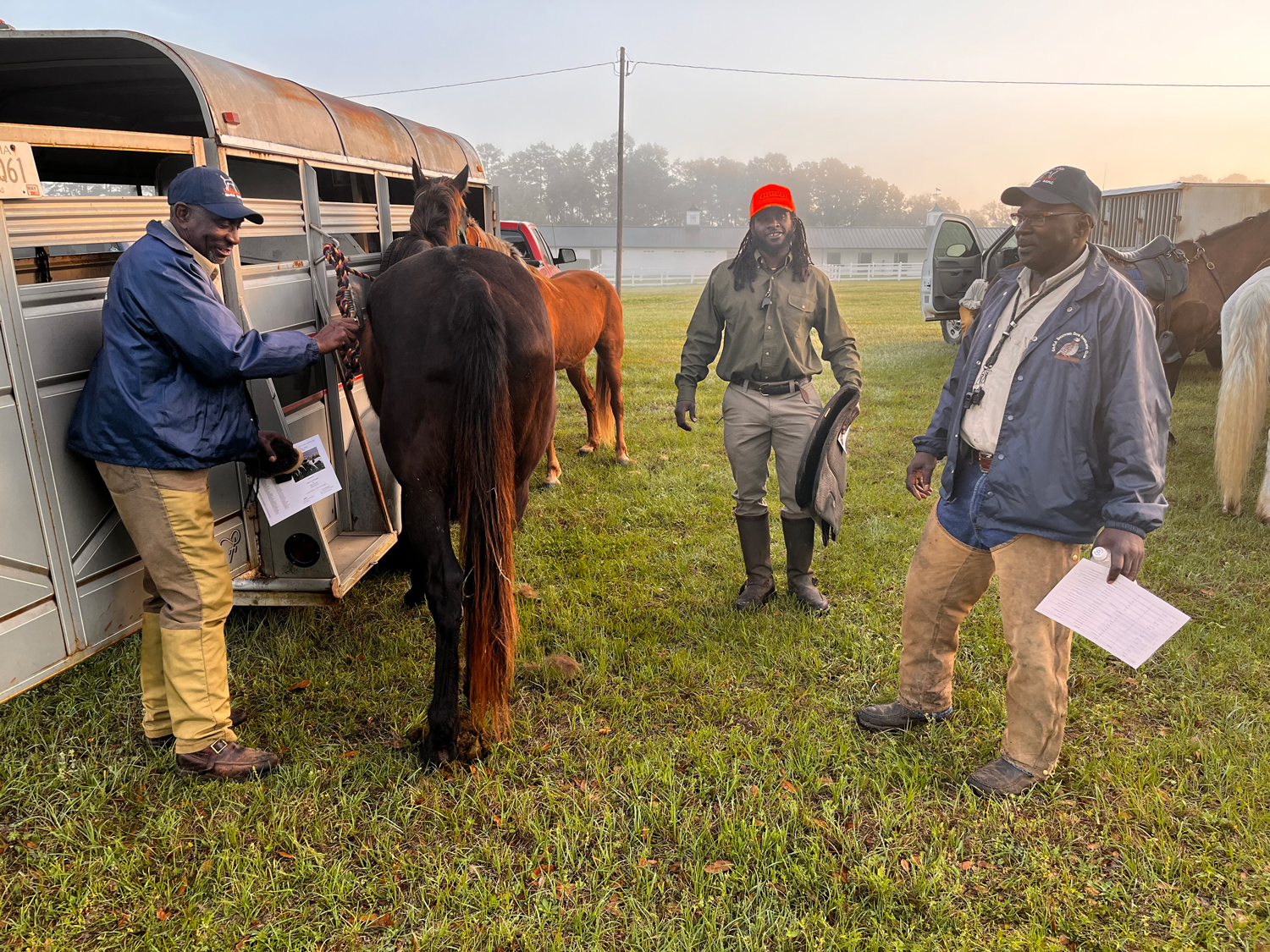
She had heard about the Black Dog Handler’s Club but didn’t know how to reach any of the members. Fate intervened. Her son had a history fair project, and they went to do research at the Jack Hadley Black History Museum in Thomasville where she saw a magazine article about the group. Through the story, she located Neal and found another club member, Durrel Smith, on Instagram. Neal and Durrel offered to teach her the fine art of bird dog training. One day after a training session, Neal asked her to become a member of the club. She described it as “a teary-eyed moment” that she could prove herself worthy of the invitation. There was some resistance from the other members who felt that she was too inexperienced, she explained, but Neal went to bat for her. She put the work in. Over the past year, Manda has been carving out training time in the morning, lunch breaks and evenings. She’s in it for the long haul and wants to continue as a dedicated club member.
But the legacy club members are still always trying to recruit sons and nephews into the profession of dog handler. One club member told me, “I’m the last one in my family who’s training dogs. None of my boys want to do it, because there’s long hours involved.”
Curtis Brooks, Jr., who fielded Jacob from Levi’s Crossroads Plantation in the 2023 field trials, started working on the quail plantations at age 16 scouting for wild quail on horseback under the guidance of his father, Curtis Brooks, Sr., who competed against his son by running Dexter from Brooks Kennels.
So far, though, the older guys, hardened by a life of quail hunting, are holding up just fine as of 2023. After the 11th and final brace that ended at 4:45, the entire party ambled back to the barn for the awards ceremony, which was pretty darn informal. Jamal Nickelson, who competed with Kelly Pond Minnie from Kelly Pond Plantation, finished third. Second place was taken by Terry Wynn whose pointer, Kate, came from Burnt Branch Plantation. And the number-one handler for the 2023 Black Dog Handler’s Field Trial, winning both a trophy and a year’s worth of bragging rights, was Lamont Brinson who took top honors with Lucky from Milestone Plantation.
Come next year, I can only hope to get another invitation.
This article originally appeared in the 2024 September/October issue of Sporting Classics magazine.

